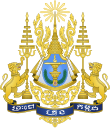
Back حقوق الإنسان في كمبوديا Arabic Droits de l'homme au Cambodge French Hak asasi manusia di Kamboja ID ადამიანის უფლებები კამბოჯაში Georgian Права человека в Камбодже Russian สิทธิมนุษยชนในประเทศกัมพูชา Thai
| This article is part of a series on the |
| Politics of Cambodia |
|---|
 |
The human rights situation in Cambodia is facing growing criticisms both within the country and from an increasingly alarmed international community. After a series of flagrant violations against basic human rights a feeling of incertitude regarding the direction the country is emerging, sometimes comparing the situation to a newborn Burma.[1]
In its report on Cambodia, Human Rights Watch stated that "Authorities continue to ban or disperse most public demonstrations. Politicians and journalists critical of the government face violence and intimidation and are barred from equal access to the broadcast media. In addition, the judiciary remains weak and subject to political influence. Sex trafficking in Cambodia of women and children through networks protected or backed by police or government officials is rampant. The government continues to turn a blind eye to fraudulent confiscation of farmers' land, illegal logging, and widespread plundering of natural resources."[2]
The current state of the country could be described as a semblance of pluralistic democracy. In July 2004, the royalist opposition party FUNCINPEC formed a coalition government with the Cambodian People's Party (CPP) after a political deadlock of more than a year. More recently, Sam Rainsy Party (SRP) members have been targeted for criminal prosecutions, after seeing the parliamentary immunity of several SRP members lifted by a criticized closed-door hand vote with members of the parliament.
The NGO Human Rights Watch offers this assessment of the current state of affairs in Cambodia:
Prime Minister Hun Sen, a former Khmer Rouge commander, had been in power since 1985. His rule had relied on security force violence and politically motivated persecution of opposition members, activists, and human rights workers. Security forces commit killings and torture with impunity. Authorities regularly restrict the right to peaceful assembly by suppressing protests and banning nonviolent gatherings and processions. The politically powerful have carried out forced evictions and illegal land grabs for decades. Government officials and judges are mired in corruption. Garment industry workers, primarily women, are subject to sexual discrimination and other rights abuses.[2]
- ^ "Cambodia: Hun Sen Systematically Silences Critics". hrw.org. Human Rights Watch. Retrieved 19 July 2017.
- ^ a b "Cambodia". hrw.org. Human Rights Watch. Retrieved 19 July 2017.